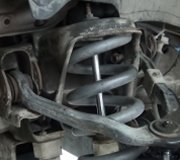The miles really aren't the issue. The damage can be done with the vehicle still on the hoist. This wasn't such a problem many years ago when cars were bigger and heavier because the studs were fatter and required much higher torque values. Also, everything came with steel wheels which are more forgiving. Today mechanics from that era who were accustomed to using air wrenches have learned their lessons long ago. They're the most likely to drag out the torque wrench, and they fear cutting corners or taking shortcuts.
It's the inexperienced and untrained mechanics who grab the impact gun to save time. They don't understand the importance of equal and correct torque on the nuts. Competent do-it-yourselfers are the most likely to think "if tight is good, tighter is better".
Another important point is we often like to place grease on the threads to prevent them from rusting. When we can't get a lug nut loose, it is really more from over-tightening in the past than it is from rust. A light film of grease on the threads won't hurt, but there are some things to be aware of. The first is the lug nuts must be run on by hand, not with air tools. The grease can build up ahead of the spinning nut, then get flung out onto the friction surface between the wheel and nut. That friction is needed to hold the nut tight and grease prevents that.
The second issue worth mentioning has mostly to do with imports. Most of them have silver, light blue, or light yellow studs. That color is an anodized coating which is a lubricant already. Adding grease will dissolve that coating, and that can lead to peeling the threads the next time the nut is removed. No grease should be used on anodized studs.
A third, less-common problem involves anti-seize compound. Use of that on lug nuts and studs might get a mechanic one verbal warning, but for a second occurrence, he will be invited to look for work at some other shop. This is a really big deal that no shop owner wants the liability for.
I had one car that a well-meaning coworker had replaced the struts on, then sent it to me for the alignment. He used anti-seize compound on the two really fat lower strut bolts, thinking that would make it easier for me to get them loose. In fact, I couldn't tighten them enough to stop the wheels from flopping in on top, badly out-of-alignment. Out of frustration for failing to tighten them enough three times, I over-tightened them so much with a had ratchet, that I snapped one of them. I actually pulled a 7/8"-diameter bolt apart in the middle. There was absolutely no friction between the nut and the bolt and the strut. That's when I had to take it apart and I saw the anti-seize compound. Regular axle grease won't cause that lack of friction.
That sad story illustrates why there is no place for anti-seize compound around wheel studs.
For my last comment of value, be aware that a lot of vehicles today come with cast wheels. Those are soft and are prone to damage from the nuts' mating surfaces becoming deformed from over-tightening. Once that happens, the nuts will never remain tight and the wheel must be replaced. It is also not uncommon for the nuts to work loose as slight irregularities in the mating surfaces grind away. For that reason, it is common to expect to have to recheck the tightness at least once after 50 to 100 miles.
Monday, January 20th, 2020 AT 4:32 PM


